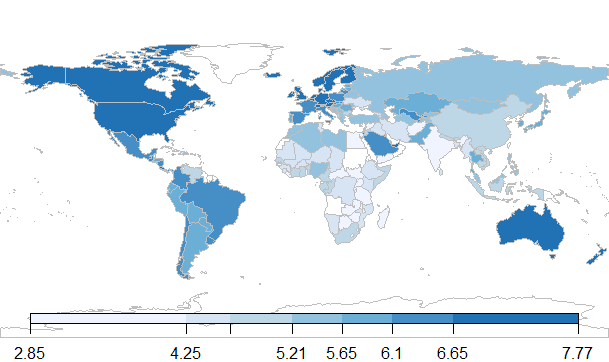World Happiness 2019
Happiness is considered to be the proper measure of social progress and the goal of public policy. Over the last 10 years ‘happiness’ has come into vogue in international affairs and the international development discourse of the late. The term appears to have broken through a 30 year old exile from the official policy discourse as it shows signs of a slow but steady re- emergence from an obsolete past where the mere use of the word ‘happiness’ appeared to belong principally to the sphere of art and literature. Consequently, a series of publications have significantly promoted ‘happiness’ as a legitimate term to use in the public discourse and policy making of ‘good life’ in combination in the place with more casual wording such as ‘well-being’, ‘welfare’ or ‘wellness’. Although we may sometimes neglect to cultivate our own happiness, feeling happy is intrinsically important. If we are happy it has added knock on effects and benefits. These include us becoming more compassionate and feeling healthier both physically and emotionally. We become more creative, witty, energetic and fun to be around and it can also lead us to become more financially successful. Very few of us live our lives in complete isolation. We will have partners, families, friends and work colleagues with whom we interact on a daily basis so if we’re happy, then it’s likely to mean that they’ll feel happier too. Therefore, through our own happiness, we are actually giving something to other people too and enabling them to feel happy as well.
Now, if we open that up and take it to a global level, it can make a massive impact. For example, unhappiness is at the core of all the breeding grounds of war and terrorist activity. Countries only attack other countries if they’re feeling unhappy about certain realities and we’re all only too aware how terrorist ideals come about as a result of their real or perceived injustice and unhappiness about various religious, social, political or economic realities. The fundamental reason why happiness is so important is that it’s extremely vital to our own goals in life and can help us achieve many other cherished personal ambitions and goals. Also, by being happy, we have the potential to change many other lives just by being ourselves.
7th World Happiness Report was published in 2019. The first was released in April 2012 in support of a UN High level meeting on “Wellbeing and Happiness: Defining a New Economic Paradigm”. That report presented the available global data on national happiness and reviewed related evidence from the emerging science of happiness, showing that the quality of people’s lives can be coherently, reliably, and validly assessed by a variety of subjective well-being measures, collectively referred to then and in subsequent reports as “happiness.” Each report includes updated evaluations and a range
of commissioned chapters on special topics digging deeper into the science of well-being, and
on happiness in specific countries and regions. Often there is a central theme. This year we focus on happiness and community: how happiness has been changing over the past dozen years, and how information technology, governance and social norms influence communities.
In 2019 World Happiness Report, 156 countries have been considered and they have been given a "Happiness Score" after considering several variables and scores which were developed using actual variable values. World Happiness scores according to the report are shown in figure 1
Now, if we open that up and take it to a global level, it can make a massive impact. For example, unhappiness is at the core of all the breeding grounds of war and terrorist activity. Countries only attack other countries if they’re feeling unhappy about certain realities and we’re all only too aware how terrorist ideals come about as a result of their real or perceived injustice and unhappiness about various religious, social, political or economic realities. The fundamental reason why happiness is so important is that it’s extremely vital to our own goals in life and can help us achieve many other cherished personal ambitions and goals. Also, by being happy, we have the potential to change many other lives just by being ourselves.
7th World Happiness Report was published in 2019. The first was released in April 2012 in support of a UN High level meeting on “Wellbeing and Happiness: Defining a New Economic Paradigm”. That report presented the available global data on national happiness and reviewed related evidence from the emerging science of happiness, showing that the quality of people’s lives can be coherently, reliably, and validly assessed by a variety of subjective well-being measures, collectively referred to then and in subsequent reports as “happiness.” Each report includes updated evaluations and a range
of commissioned chapters on special topics digging deeper into the science of well-being, and
on happiness in specific countries and regions. Often there is a central theme. This year we focus on happiness and community: how happiness has been changing over the past dozen years, and how information technology, governance and social norms influence communities.
In 2019 World Happiness Report, 156 countries have been considered and they have been given a "Happiness Score" after considering several variables and scores which were developed using actual variable values. World Happiness scores according to the report are shown in figure 1
 |
| Figure 1 : World Happiness Score 2018
More detailed information about 2018 Happiness Scores is shown in Figure 2 .
According to World Happiness Report of 2018, Happiness Score lies between 2.853 and 7.769.
Most of the happiest countries are situated in European region. Most 10 happiest countries are,
Most of the Asian countries and African countries are worst happiest countries. Sri Lanka is in 130th position with a score of 4.3659. Seems like most of the developed countries are happy and other developing and least-developed countries are not happy.
|
Comments
Post a Comment